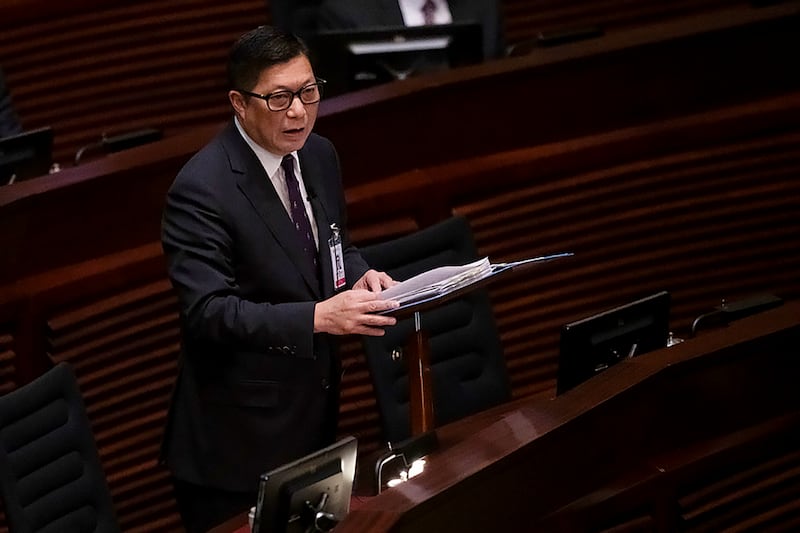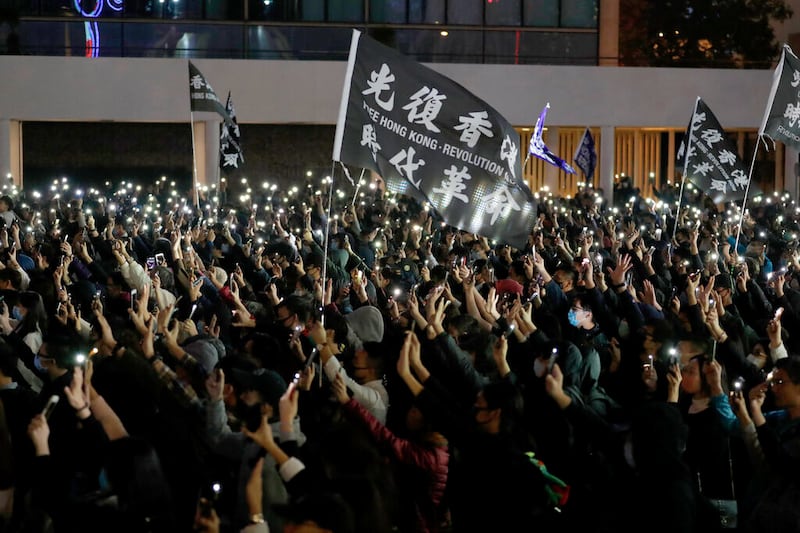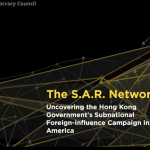Matthew Leung for RFA Cantonese
Read coverage of this story in Chinese
Authorities in Hong Kong have vowed to keep pursuing thousands of people arrested for their part in the city’s 2019 pro-democracy protests, rejecting suggestions that charges against some 6,000 people arrested but not yet charged could be allowed to lapse, in a sign that a crackdown on the movement will likely continue indefinitely.
“Some people have suggested that if no charges are made by a certain time limit, we should agree not to prosecute,” Secretary for Security Chris Tang told journalists on Monday. “This would be tantamount to legalizing the illegal.”
“I don’t think this is in line with the principle of the rule of law,” Tang said. “If something is illegal, then it’s illegal, and we will prosecute if there is evidence.”
Police made more than 10,000 arrests during and after the 2019 protests, which began as a show of mass public anger at plans to allow the extradition of alleged criminal suspects to mainland China and broadened to include demands for fully democratic elections and greater official accountability.
Yet some 6,000 of those people have yet to be charged, and many have fled overseas, where 13 of the most prominent activists have a bounty on their heads.
Tang’s comments were a public rebuttal of remarks made earlier by former Secretary for Transport and Housing Anthony Cheung, who had hinted in a media interview that the authorities could consider “drawing a line” under cases beyond a certain time limit.
Prosecutions were under way or completed in 2,961 cases out of the 10,279 protest-related arrests by the end of March 2024, leaving thousands arrested but not yet prosecuted.
Tang said that it took time for police officers to examine surveillance footage of the protests to track the movements of individuals and gather evidence to support each allegation.
While the 2020 National Security Law ushered in a citywide crackdown on political opposition and public dissent that effectively put paid to Hong Kong’s tradition of organized protest, the authorities have continued to claim that the movement was instigated by “hostile foreign forces,” and could re-emerge to disrupt the city at any time.
Showing loyalty to Beijing
A former participant in the 2019 protests, who gave only the nickname A Jing for fear of reprisals, said he had eventually left Hong Kong after charges against him were dropped.
He said the claim that the protests could restart at any time was largely a way for the administration of Chief Executive John Lee to show loyalty to his bosses in Beijing.
“To put it bluntly, it’s about getting funding, blagging funds from national coffers,” A Jing told RFA Cantonese in a recent interview. “They’re lying to get ahold of resources.”
“Everyone knows that Hong Kong no longer has the capacity for the kind of large-scale mobilization that we saw in 2019,” he said. “Most people in Hong Kong just want to get on with their lives in peace, and of course that would mean no cases for them to handle.”
“That’s why they have to keep bragging about what they’ve done and keep on exaggerating the size of the threat,” A Jing said.

Current affairs commentator Benson Wong said Tang and Lee, both former police chiefs, rose to power on the back of the police response to mass protest movements, and are continuing to cash in on the political dividends from their reputation as strong enforcers of the law.
“Most ordinary people are pretty moderate, and just want Hong Kong to recover, for the crackdown to ease and for the atmosphere to improve,” Wong said. “But Hong Kong is now ruled by disciplinary forces that have little regard for its administration and governance or even solving its economic problems.”
“This leaves Hong Kongers with no hope in their current lives, or for the future,” he said.
To flee or not to flee
According to A Jing, many of the 6,000 who have been arrested but not charged are having to decide whether or not to flee based on how harsh they think their eventual sentences could be.
“It really makes sense for someone to flee if they think they could be sentenced to 10 or 20 years, because that would be most of their life gone,” he said. “But some may think they could serve 2-3 years, and they may have heard … that emigrating means losing everything that’s important to them and starting over somewhere else.”
“Who’s going to start their whole life over again for just two or three years? That would be irrational. So everyone has their own choice to make,” he said.
Secretary for Justice Paul Lam said in an interview published in the Oct. 28 edition of the Ming Pao newspaper that arrestees were “free to live their lives.”
But some arrestees have reported being searched on arriving back in Hong Kong, while others face reprisals from their employers or professional bodies.
And others find the psychological uncertainty over a possible future prosecution is affecting their well-being.
“I’m anxious about everything these days,” a former arrestee who gave only the surname Chan for fear of reprisals told RFA Cantonese. “The lawyer told me … that they could just suddenly call me up one day and go ahead with the prosecution.”

Chan, who was seriously injured by police during his arrest, says he still suffers from flashbacks to the incident. “I feel like I have PTSD, memories of being pinned to the ground and beaten with police batons,” he said.
Last time he went to neighboring Macau to celebrate his girlfriend’s birthday, the couple were taken aside to a detention room on their return to Hong Kong, where they were held for 30 minutes as Chan was searched.
“The guy told me the computer prompted him to do that when it registered my ID card,” Chan said. “So every time I travel, I’ll be taken to the detention room where I’ll have to give a statement, submit to a body search and have my phone scanned.”
“I’ve been too worried to travel anywhere after that,” he said, adding that friends of his in the same situation have reported similar experiences.
Translated by Luisetta Mudie.

